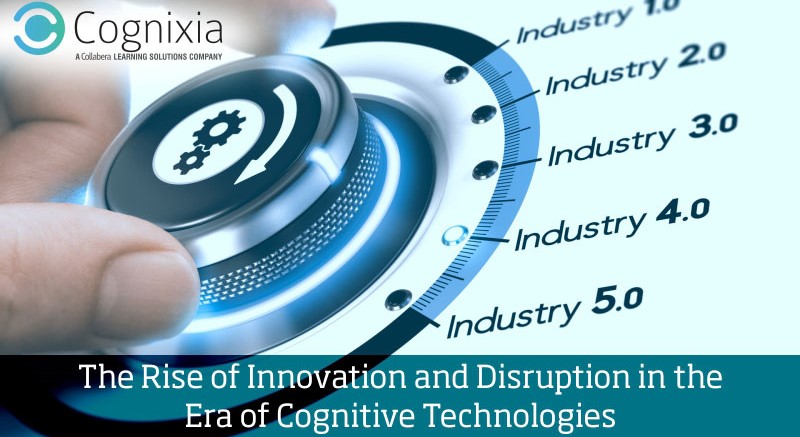The technology landscape is ever-changing. Tools, languages, and platforms arrive, affect, and advance. Some are ephemeral phenomena, while some disrupt and transform the market, and have a long-term presence. As we have already advanced into the Industry 4.0 age, cognitive technologies promise to be highly disruptive for industries of every type and size. What will be the implication of the rise of cognitive technologies for enterprises? How will enterprises cope with the massive innovation and disruption promised by these technologies? Let us try to find the answer.
According to IDC, cognitive technologies in unison with IoT, Robotics, Machine Learning & AI, Augmented/Virtual Reality, and Big Data upsurges the ability of machines to mimic and enrich human intelligence in real time.
The Rise of the Cognitive Age
Cognitive computing signifies the cutting-edge computing technologies embracing disciplines such as Machine Learning & AI, Deep Learning, Natural Language Processing (NLP), and Signal Processing, to name a few. It is the simulation of human thought process into machines leveraging data mining, pattern recognition, and natural language processing that mimics the human brain and its working. These technologies are aimed at creating automated IT systems that can solve complex problems, requiring human intelligence, without actual human intervention.
Forrester predicts that the advent of cognitive age will create new jobs such as robot monitoring professionals, automation specialists, and content curators. By 2025, there will be more than 8.9 million new jobs in the US itself.
Cognitive era promises to bring about a paradigm shift and added value by redefining the way we interact with machines; how machines interact with other machines and the environment they are in. By harnessing cognitive technologies, enterprises will be able to transform their business towards the positive course, but only when they are ready to withstand the substantial disruption.

Benefits of Cognitive Computing for Enterprises
Cognitive computing will give rise to a new model comprising a wide range of innovations in Machine Learning, Analytics, and Natural Language Processing. This new model will have a transformative consequence for enterprises that will gain business advantage powered by systems capable to reason and learn. The proliferation of cognitive technologies is, and will further be rapid since it makes practical business sense.
According to IDC, extensive implementation of cognitive computing and AI across a wide range of industries will drive worldwide revenues from about $8.0 billion in 2016 to more than $47 billion in 2020.
The key drivers of the cognitive computing age will be other computing platforms such as the Cloud, IoT, Mobile, Analytics and Big Data. Big Data, in particular, holds the increasingly huge and complex data-sets that not only can be the source of significant insights but also will be the answer to critical questions for enterprise success. And last but not the least, AI and the advancements made in this area will determine the degree of propagation of cognitive computing for enterprises.
As per the cognitive advantage report by IBM, enterprises utilizing cognitive technologies have already started to gain a competitive advantage in the form of high customer engagement, productivity & efficiency, and an overall business growth.
Challenges to the Adoption of Cognitive Computing
One of the biggest challenges to the adoption of any cutting-edge technology, like cognitive computing, is the limited number of case studies that create a potential hurdle in large-scale investment. Enterprises naturally want to have a clearer picture regarding the business value and ROI (Return on Investment).
According to Forrester, 93% of technologists in the automation industry believe themselves to be unprepared or partially prepared to confront the challenges associated with smart machine technologies.
The cost and effort required to implement AI technologies can be on the higher side, especially for SMEs. Once implemented, cognitive systems rely on big data, and there can be concerns about data security since such huge amounts of data are derived from multiple systems and sources. There must, thus, be prearrangement for cybersecurity tools and technologies, which will increase the economic overhead discouraging enterprises to adopt cognitive computing despite providing a competitive advantage.
Another significant challenge is the dearth of skilled professionals since cognitive technologies are emerging rapidly in the market. This insufficiency of skills daunts enterprises from adopting emerging technologies.
Training & Certification in Cognitive Technologies
Cognitive technologies have, and will continue to disrupt the technology landscape. Enterprises adopting these technologies will gain the upper hand, while those mired by the cloud of skepticism will lag behind. In such a scenario, Cognixia training and certification in these emerging cognitive technologies can be one of the best alternatives, both in coping with the innovation and disruption anticipated and in overcoming the challenges to adopt these technologies.
As trained professionals increase in number, they will bridge the demand and supply gap of cognitive technology expertise thus eliminating the doubts of creating significant value, minimizing cost and making considerable ROI. Enterprises seeking a competitive advantage must consider partnering with a professional learning partner to train their workforce and harness the transformative capabilities promised by the cognitive technologies of the Industry 4.0 era.
~ Sunny Shah
